Economic Impact of Online Accounting Systems on Australian SMEs
VerifiedAdded on 2023/05/30
|8
|1763
|411
Report
AI Summary
This report examines the economic impact of online accounting systems on small businesses in Australia. It defines online accounting systems and small businesses, highlighting the challenges related to information sharing and efficiency in accounting departments. The report explores how online accounting systems can be efficiently utilized to increase returns, leverage cost reduction, and improve knowledge management. It discusses the importance of data manipulation and information accuracy, referencing internal and external information sources. Ethical considerations related to the use of social media for data collection and knowledge management are also addressed, alongside references to relevant academic literature. Desklib provides access to similar solved assignments and past papers for students.
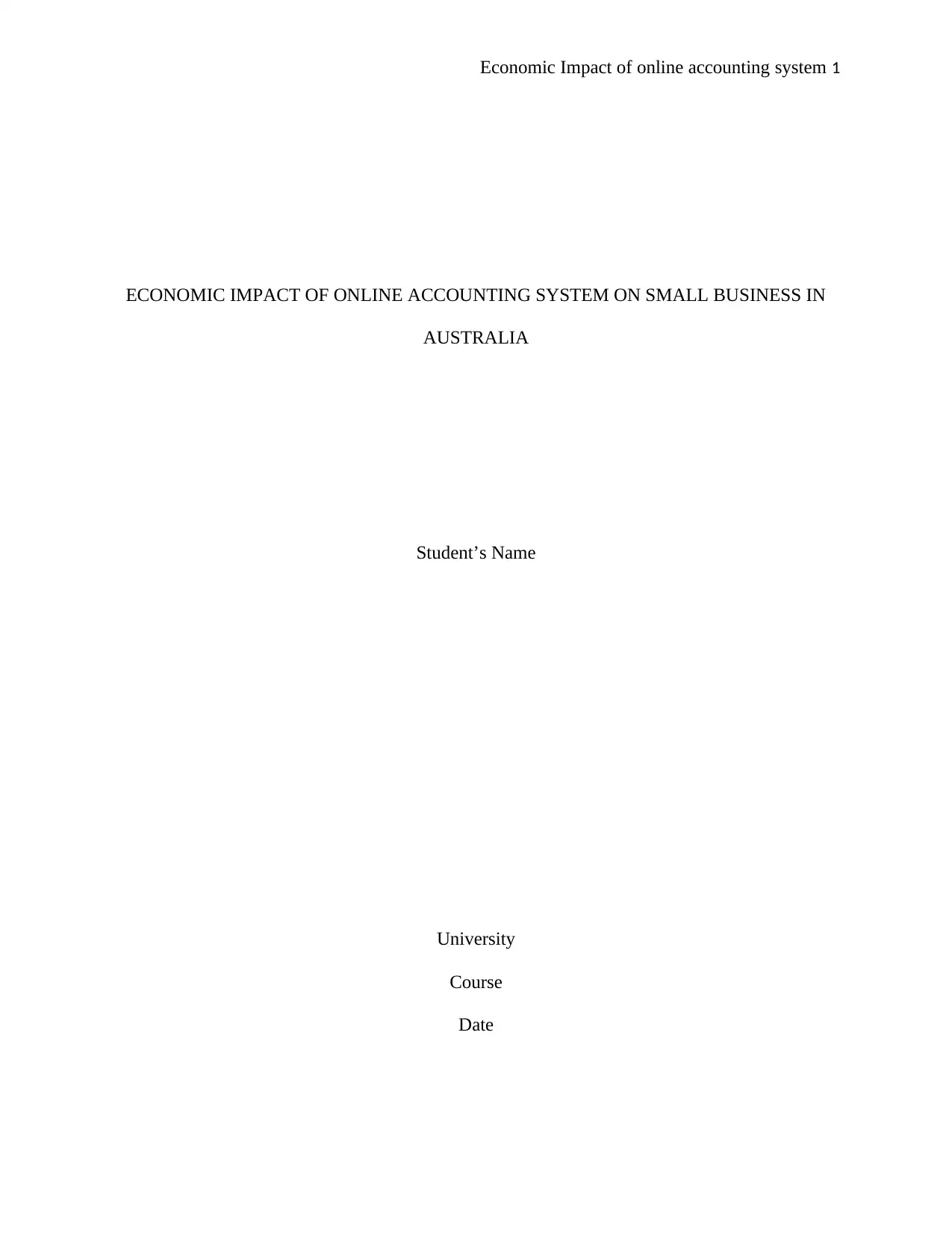
Economic Impact of online accounting system 1
ECONOMIC IMPACT OF ONLINE ACCOUNTING SYSTEM ON SMALL BUSINESS IN
AUSTRALIA
Student’s Name
University
Course
Date
ECONOMIC IMPACT OF ONLINE ACCOUNTING SYSTEM ON SMALL BUSINESS IN
AUSTRALIA
Student’s Name
University
Course
Date
Paraphrase This Document
Need a fresh take? Get an instant paraphrase of this document with our AI Paraphraser
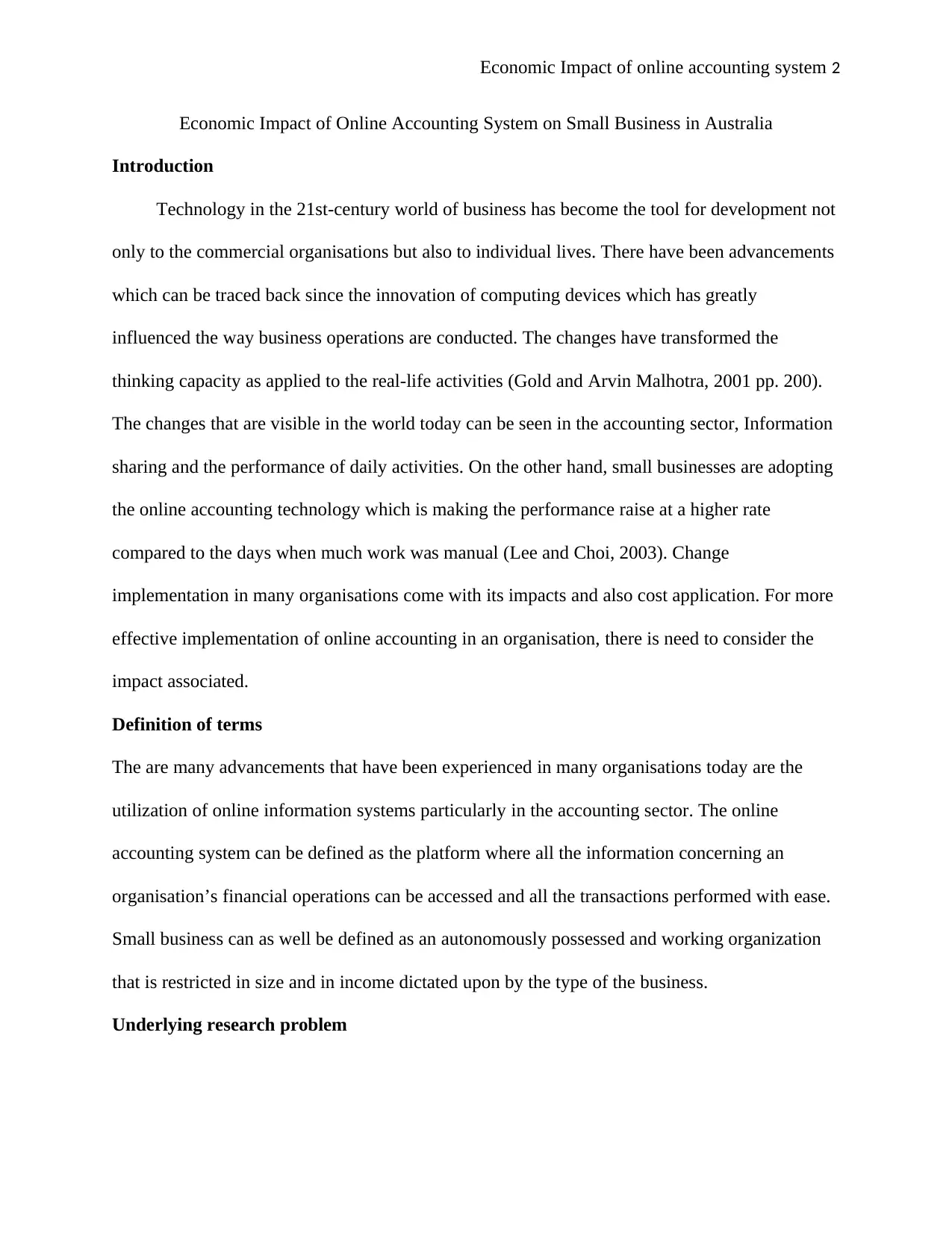
Economic Impact of online accounting system 2
Economic Impact of Online Accounting System on Small Business in Australia
Introduction
Technology in the 21st-century world of business has become the tool for development not
only to the commercial organisations but also to individual lives. There have been advancements
which can be traced back since the innovation of computing devices which has greatly
influenced the way business operations are conducted. The changes have transformed the
thinking capacity as applied to the real-life activities (Gold and Arvin Malhotra, 2001 pp. 200).
The changes that are visible in the world today can be seen in the accounting sector, Information
sharing and the performance of daily activities. On the other hand, small businesses are adopting
the online accounting technology which is making the performance raise at a higher rate
compared to the days when much work was manual (Lee and Choi, 2003). Change
implementation in many organisations come with its impacts and also cost application. For more
effective implementation of online accounting in an organisation, there is need to consider the
impact associated.
Definition of terms
The are many advancements that have been experienced in many organisations today are the
utilization of online information systems particularly in the accounting sector. The online
accounting system can be defined as the platform where all the information concerning an
organisation’s financial operations can be accessed and all the transactions performed with ease.
Small business can as well be defined as an autonomously possessed and working organization
that is restricted in size and in income dictated upon by the type of the business.
Underlying research problem
Economic Impact of Online Accounting System on Small Business in Australia
Introduction
Technology in the 21st-century world of business has become the tool for development not
only to the commercial organisations but also to individual lives. There have been advancements
which can be traced back since the innovation of computing devices which has greatly
influenced the way business operations are conducted. The changes have transformed the
thinking capacity as applied to the real-life activities (Gold and Arvin Malhotra, 2001 pp. 200).
The changes that are visible in the world today can be seen in the accounting sector, Information
sharing and the performance of daily activities. On the other hand, small businesses are adopting
the online accounting technology which is making the performance raise at a higher rate
compared to the days when much work was manual (Lee and Choi, 2003). Change
implementation in many organisations come with its impacts and also cost application. For more
effective implementation of online accounting in an organisation, there is need to consider the
impact associated.
Definition of terms
The are many advancements that have been experienced in many organisations today are the
utilization of online information systems particularly in the accounting sector. The online
accounting system can be defined as the platform where all the information concerning an
organisation’s financial operations can be accessed and all the transactions performed with ease.
Small business can as well be defined as an autonomously possessed and working organization
that is restricted in size and in income dictated upon by the type of the business.
Underlying research problem
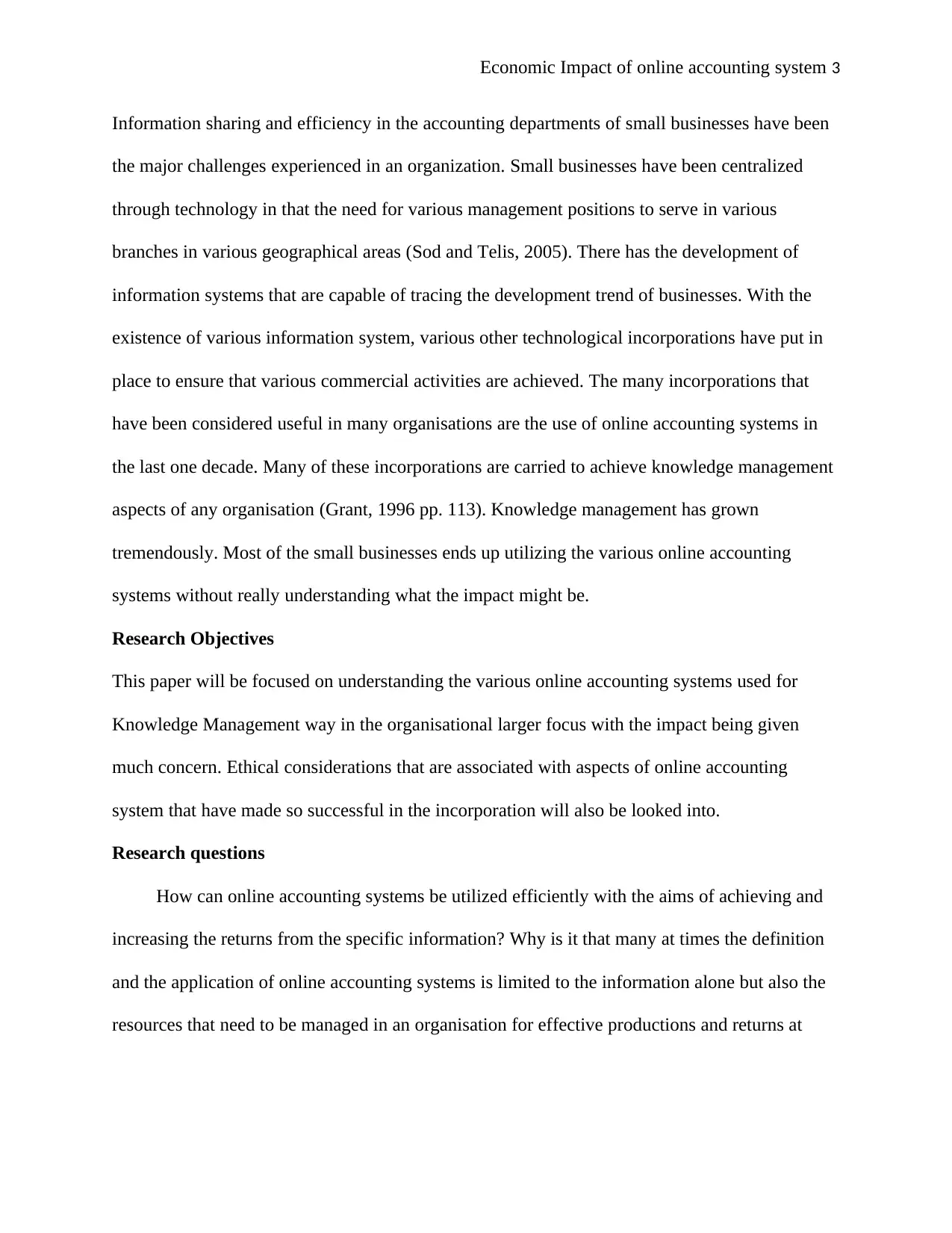
Economic Impact of online accounting system 3
Information sharing and efficiency in the accounting departments of small businesses have been
the major challenges experienced in an organization. Small businesses have been centralized
through technology in that the need for various management positions to serve in various
branches in various geographical areas (Sod and Telis, 2005). There has the development of
information systems that are capable of tracing the development trend of businesses. With the
existence of various information system, various other technological incorporations have put in
place to ensure that various commercial activities are achieved. The many incorporations that
have been considered useful in many organisations are the use of online accounting systems in
the last one decade. Many of these incorporations are carried to achieve knowledge management
aspects of any organisation (Grant, 1996 pp. 113). Knowledge management has grown
tremendously. Most of the small businesses ends up utilizing the various online accounting
systems without really understanding what the impact might be.
Research Objectives
This paper will be focused on understanding the various online accounting systems used for
Knowledge Management way in the organisational larger focus with the impact being given
much concern. Ethical considerations that are associated with aspects of online accounting
system that have made so successful in the incorporation will also be looked into.
Research questions
How can online accounting systems be utilized efficiently with the aims of achieving and
increasing the returns from the specific information? Why is it that many at times the definition
and the application of online accounting systems is limited to the information alone but also the
resources that need to be managed in an organisation for effective productions and returns at
Information sharing and efficiency in the accounting departments of small businesses have been
the major challenges experienced in an organization. Small businesses have been centralized
through technology in that the need for various management positions to serve in various
branches in various geographical areas (Sod and Telis, 2005). There has the development of
information systems that are capable of tracing the development trend of businesses. With the
existence of various information system, various other technological incorporations have put in
place to ensure that various commercial activities are achieved. The many incorporations that
have been considered useful in many organisations are the use of online accounting systems in
the last one decade. Many of these incorporations are carried to achieve knowledge management
aspects of any organisation (Grant, 1996 pp. 113). Knowledge management has grown
tremendously. Most of the small businesses ends up utilizing the various online accounting
systems without really understanding what the impact might be.
Research Objectives
This paper will be focused on understanding the various online accounting systems used for
Knowledge Management way in the organisational larger focus with the impact being given
much concern. Ethical considerations that are associated with aspects of online accounting
system that have made so successful in the incorporation will also be looked into.
Research questions
How can online accounting systems be utilized efficiently with the aims of achieving and
increasing the returns from the specific information? Why is it that many at times the definition
and the application of online accounting systems is limited to the information alone but also the
resources that need to be managed in an organisation for effective productions and returns at
⊘ This is a preview!⊘
Do you want full access?
Subscribe today to unlock all pages.

Trusted by 1+ million students worldwide
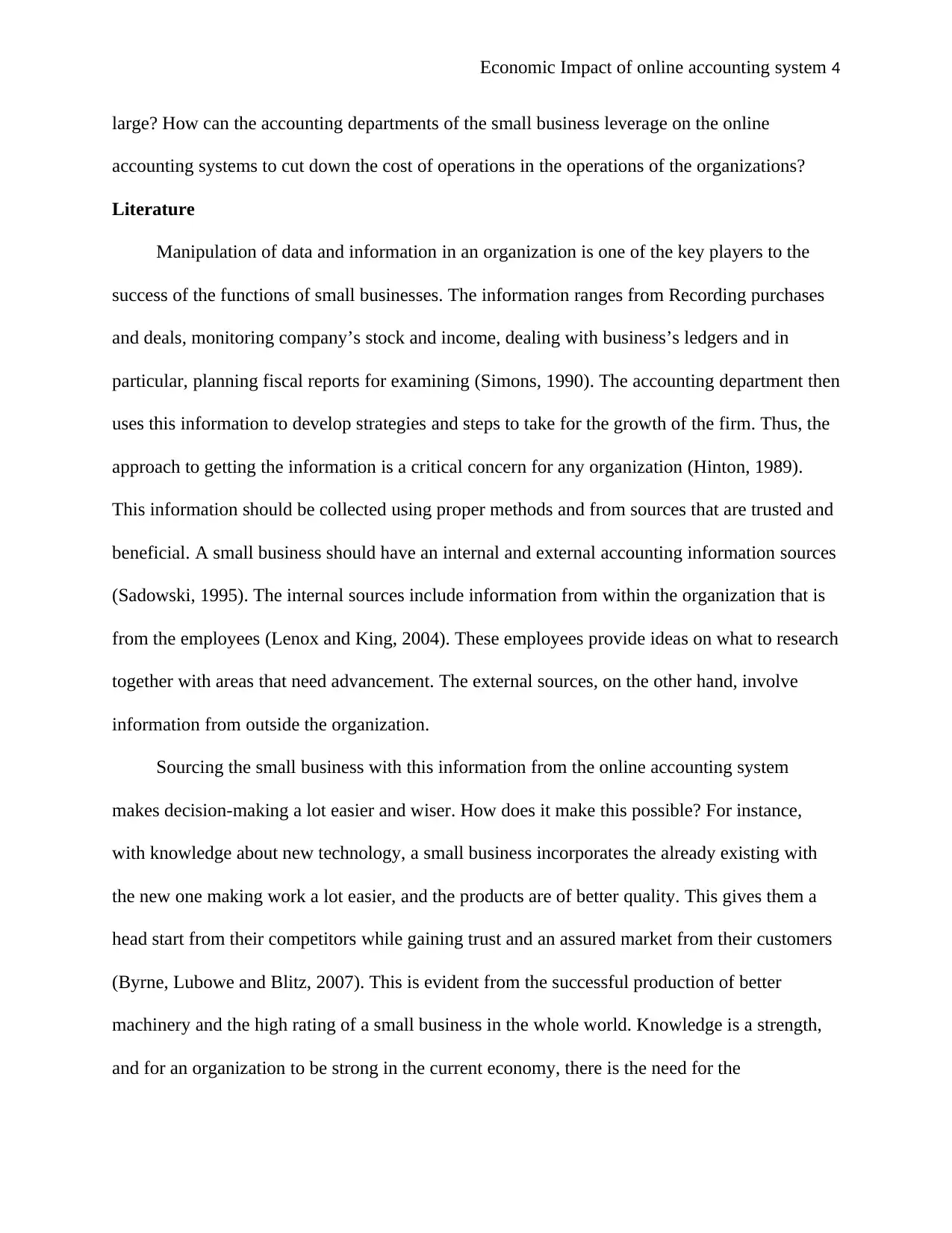
Economic Impact of online accounting system 4
large? How can the accounting departments of the small business leverage on the online
accounting systems to cut down the cost of operations in the operations of the organizations?
Literature
Manipulation of data and information in an organization is one of the key players to the
success of the functions of small businesses. The information ranges from Recording purchases
and deals, monitoring company’s stock and income, dealing with business’s ledgers and in
particular, planning fiscal reports for examining (Simons, 1990). The accounting department then
uses this information to develop strategies and steps to take for the growth of the firm. Thus, the
approach to getting the information is a critical concern for any organization (Hinton, 1989).
This information should be collected using proper methods and from sources that are trusted and
beneficial. A small business should have an internal and external accounting information sources
(Sadowski, 1995). The internal sources include information from within the organization that is
from the employees (Lenox and King, 2004). These employees provide ideas on what to research
together with areas that need advancement. The external sources, on the other hand, involve
information from outside the organization.
Sourcing the small business with this information from the online accounting system
makes decision-making a lot easier and wiser. How does it make this possible? For instance,
with knowledge about new technology, a small business incorporates the already existing with
the new one making work a lot easier, and the products are of better quality. This gives them a
head start from their competitors while gaining trust and an assured market from their customers
(Byrne, Lubowe and Blitz, 2007). This is evident from the successful production of better
machinery and the high rating of a small business in the whole world. Knowledge is a strength,
and for an organization to be strong in the current economy, there is the need for the
large? How can the accounting departments of the small business leverage on the online
accounting systems to cut down the cost of operations in the operations of the organizations?
Literature
Manipulation of data and information in an organization is one of the key players to the
success of the functions of small businesses. The information ranges from Recording purchases
and deals, monitoring company’s stock and income, dealing with business’s ledgers and in
particular, planning fiscal reports for examining (Simons, 1990). The accounting department then
uses this information to develop strategies and steps to take for the growth of the firm. Thus, the
approach to getting the information is a critical concern for any organization (Hinton, 1989).
This information should be collected using proper methods and from sources that are trusted and
beneficial. A small business should have an internal and external accounting information sources
(Sadowski, 1995). The internal sources include information from within the organization that is
from the employees (Lenox and King, 2004). These employees provide ideas on what to research
together with areas that need advancement. The external sources, on the other hand, involve
information from outside the organization.
Sourcing the small business with this information from the online accounting system
makes decision-making a lot easier and wiser. How does it make this possible? For instance,
with knowledge about new technology, a small business incorporates the already existing with
the new one making work a lot easier, and the products are of better quality. This gives them a
head start from their competitors while gaining trust and an assured market from their customers
(Byrne, Lubowe and Blitz, 2007). This is evident from the successful production of better
machinery and the high rating of a small business in the whole world. Knowledge is a strength,
and for an organization to be strong in the current economy, there is the need for the
Paraphrase This Document
Need a fresh take? Get an instant paraphrase of this document with our AI Paraphraser
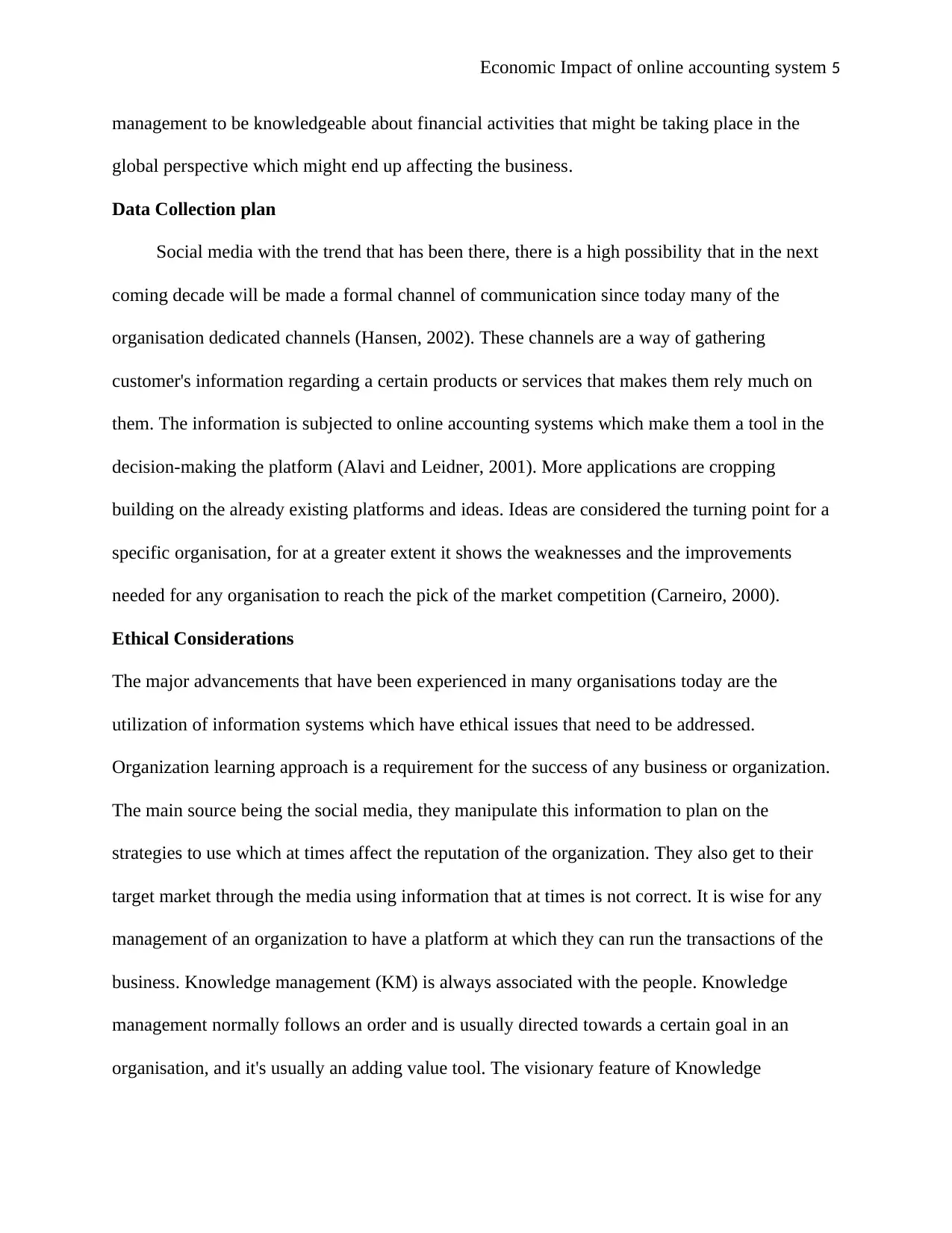
Economic Impact of online accounting system 5
management to be knowledgeable about financial activities that might be taking place in the
global perspective which might end up affecting the business.
Data Collection plan
Social media with the trend that has been there, there is a high possibility that in the next
coming decade will be made a formal channel of communication since today many of the
organisation dedicated channels (Hansen, 2002). These channels are a way of gathering
customer's information regarding a certain products or services that makes them rely much on
them. The information is subjected to online accounting systems which make them a tool in the
decision-making the platform (Alavi and Leidner, 2001). More applications are cropping
building on the already existing platforms and ideas. Ideas are considered the turning point for a
specific organisation, for at a greater extent it shows the weaknesses and the improvements
needed for any organisation to reach the pick of the market competition (Carneiro, 2000).
Ethical Considerations
The major advancements that have been experienced in many organisations today are the
utilization of information systems which have ethical issues that need to be addressed.
Organization learning approach is a requirement for the success of any business or organization.
The main source being the social media, they manipulate this information to plan on the
strategies to use which at times affect the reputation of the organization. They also get to their
target market through the media using information that at times is not correct. It is wise for any
management of an organization to have a platform at which they can run the transactions of the
business. Knowledge management (KM) is always associated with the people. Knowledge
management normally follows an order and is usually directed towards a certain goal in an
organisation, and it's usually an adding value tool. The visionary feature of Knowledge
management to be knowledgeable about financial activities that might be taking place in the
global perspective which might end up affecting the business.
Data Collection plan
Social media with the trend that has been there, there is a high possibility that in the next
coming decade will be made a formal channel of communication since today many of the
organisation dedicated channels (Hansen, 2002). These channels are a way of gathering
customer's information regarding a certain products or services that makes them rely much on
them. The information is subjected to online accounting systems which make them a tool in the
decision-making the platform (Alavi and Leidner, 2001). More applications are cropping
building on the already existing platforms and ideas. Ideas are considered the turning point for a
specific organisation, for at a greater extent it shows the weaknesses and the improvements
needed for any organisation to reach the pick of the market competition (Carneiro, 2000).
Ethical Considerations
The major advancements that have been experienced in many organisations today are the
utilization of information systems which have ethical issues that need to be addressed.
Organization learning approach is a requirement for the success of any business or organization.
The main source being the social media, they manipulate this information to plan on the
strategies to use which at times affect the reputation of the organization. They also get to their
target market through the media using information that at times is not correct. It is wise for any
management of an organization to have a platform at which they can run the transactions of the
business. Knowledge management (KM) is always associated with the people. Knowledge
management normally follows an order and is usually directed towards a certain goal in an
organisation, and it's usually an adding value tool. The visionary feature of Knowledge
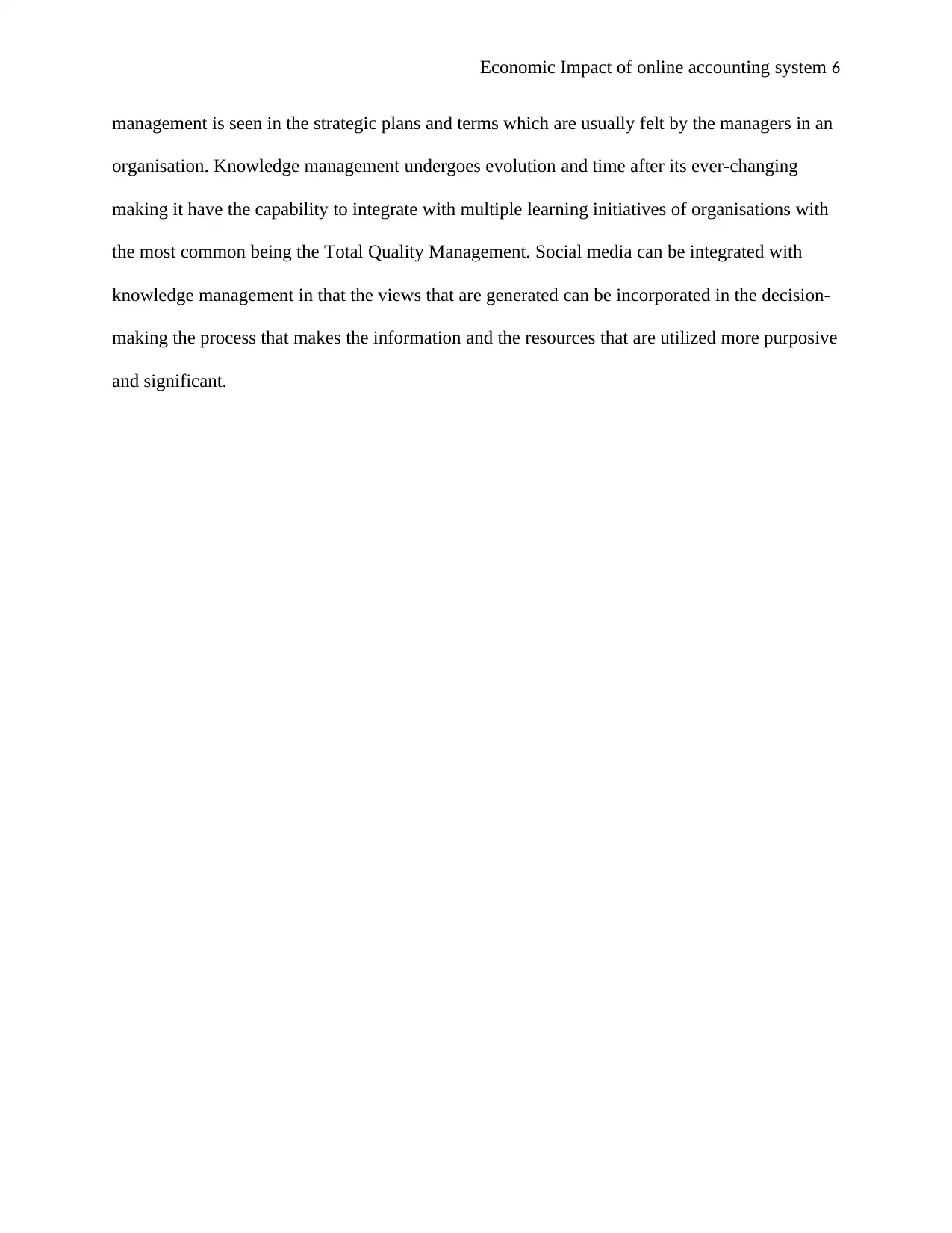
Economic Impact of online accounting system 6
management is seen in the strategic plans and terms which are usually felt by the managers in an
organisation. Knowledge management undergoes evolution and time after its ever-changing
making it have the capability to integrate with multiple learning initiatives of organisations with
the most common being the Total Quality Management. Social media can be integrated with
knowledge management in that the views that are generated can be incorporated in the decision-
making the process that makes the information and the resources that are utilized more purposive
and significant.
management is seen in the strategic plans and terms which are usually felt by the managers in an
organisation. Knowledge management undergoes evolution and time after its ever-changing
making it have the capability to integrate with multiple learning initiatives of organisations with
the most common being the Total Quality Management. Social media can be integrated with
knowledge management in that the views that are generated can be incorporated in the decision-
making the process that makes the information and the resources that are utilized more purposive
and significant.
⊘ This is a preview!⊘
Do you want full access?
Subscribe today to unlock all pages.

Trusted by 1+ million students worldwide
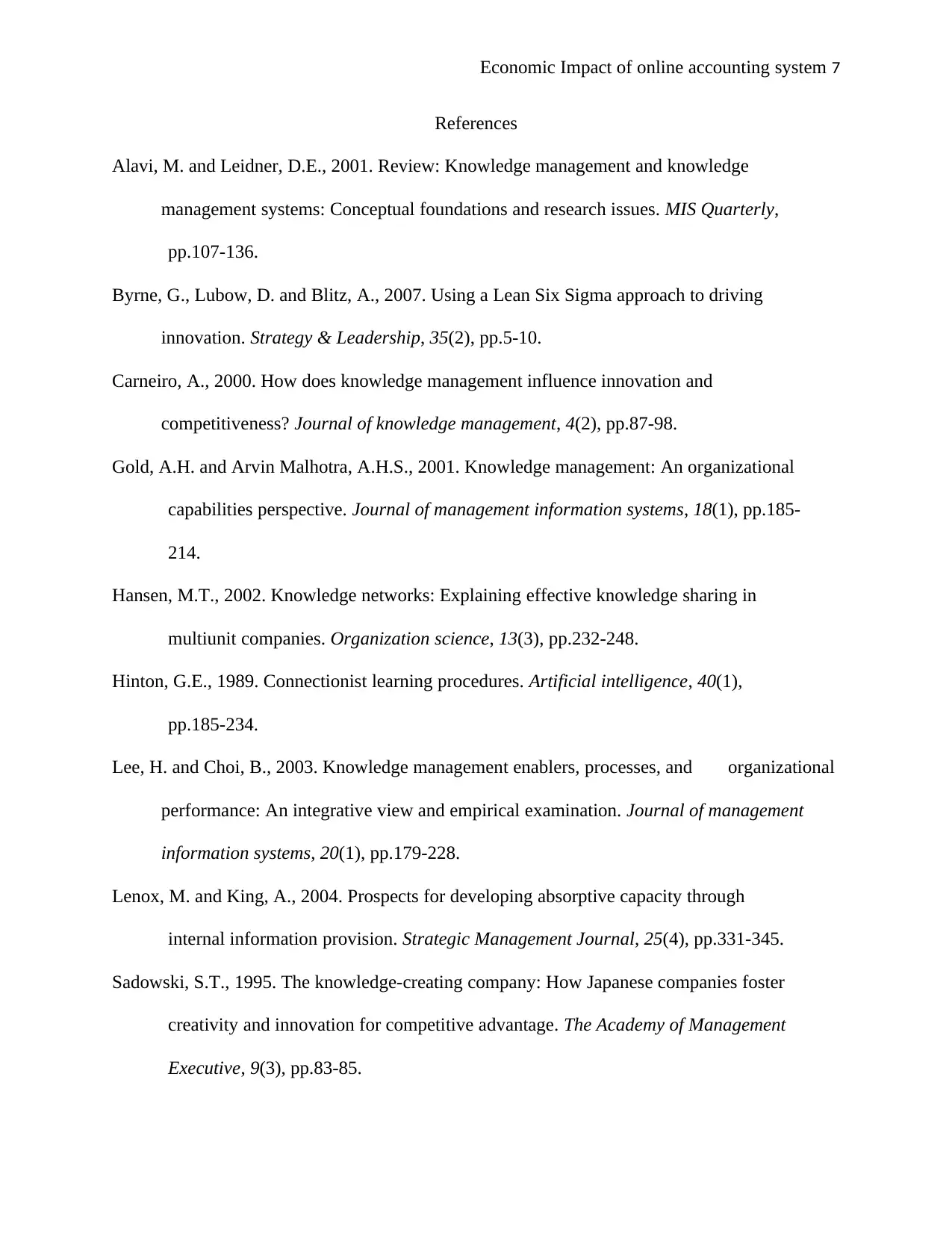
Economic Impact of online accounting system 7
References
Alavi, M. and Leidner, D.E., 2001. Review: Knowledge management and knowledge
management systems: Conceptual foundations and research issues. MIS Quarterly,
pp.107-136.
Byrne, G., Lubow, D. and Blitz, A., 2007. Using a Lean Six Sigma approach to driving
innovation. Strategy & Leadership, 35(2), pp.5-10.
Carneiro, A., 2000. How does knowledge management influence innovation and
competitiveness? Journal of knowledge management, 4(2), pp.87-98.
Gold, A.H. and Arvin Malhotra, A.H.S., 2001. Knowledge management: An organizational
capabilities perspective. Journal of management information systems, 18(1), pp.185-
214.
Hansen, M.T., 2002. Knowledge networks: Explaining effective knowledge sharing in
multiunit companies. Organization science, 13(3), pp.232-248.
Hinton, G.E., 1989. Connectionist learning procedures. Artificial intelligence, 40(1),
pp.185-234.
Lee, H. and Choi, B., 2003. Knowledge management enablers, processes, and organizational
performance: An integrative view and empirical examination. Journal of management
information systems, 20(1), pp.179-228.
Lenox, M. and King, A., 2004. Prospects for developing absorptive capacity through
internal information provision. Strategic Management Journal, 25(4), pp.331-345.
Sadowski, S.T., 1995. The knowledge-creating company: How Japanese companies foster
creativity and innovation for competitive advantage. The Academy of Management
Executive, 9(3), pp.83-85.
References
Alavi, M. and Leidner, D.E., 2001. Review: Knowledge management and knowledge
management systems: Conceptual foundations and research issues. MIS Quarterly,
pp.107-136.
Byrne, G., Lubow, D. and Blitz, A., 2007. Using a Lean Six Sigma approach to driving
innovation. Strategy & Leadership, 35(2), pp.5-10.
Carneiro, A., 2000. How does knowledge management influence innovation and
competitiveness? Journal of knowledge management, 4(2), pp.87-98.
Gold, A.H. and Arvin Malhotra, A.H.S., 2001. Knowledge management: An organizational
capabilities perspective. Journal of management information systems, 18(1), pp.185-
214.
Hansen, M.T., 2002. Knowledge networks: Explaining effective knowledge sharing in
multiunit companies. Organization science, 13(3), pp.232-248.
Hinton, G.E., 1989. Connectionist learning procedures. Artificial intelligence, 40(1),
pp.185-234.
Lee, H. and Choi, B., 2003. Knowledge management enablers, processes, and organizational
performance: An integrative view and empirical examination. Journal of management
information systems, 20(1), pp.179-228.
Lenox, M. and King, A., 2004. Prospects for developing absorptive capacity through
internal information provision. Strategic Management Journal, 25(4), pp.331-345.
Sadowski, S.T., 1995. The knowledge-creating company: How Japanese companies foster
creativity and innovation for competitive advantage. The Academy of Management
Executive, 9(3), pp.83-85.
Paraphrase This Document
Need a fresh take? Get an instant paraphrase of this document with our AI Paraphraser

Economic Impact of online accounting system 8
Simons, R., 1990. The role of management control systems in creating competitive
advantage: new perspectives (pp. 622-645). Springer US.
Sod, A. and Ellis, G.J., 2005. Technological evolution and radical innovation. Journal of
Marketing, 69(3), pp.152-168.
Simons, R., 1990. The role of management control systems in creating competitive
advantage: new perspectives (pp. 622-645). Springer US.
Sod, A. and Ellis, G.J., 2005. Technological evolution and radical innovation. Journal of
Marketing, 69(3), pp.152-168.
1 out of 8
Related Documents
Your All-in-One AI-Powered Toolkit for Academic Success.
+13062052269
info@desklib.com
Available 24*7 on WhatsApp / Email
![[object Object]](/_next/static/media/star-bottom.7253800d.svg)
Unlock your academic potential
Copyright © 2020–2025 A2Z Services. All Rights Reserved. Developed and managed by ZUCOL.




